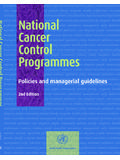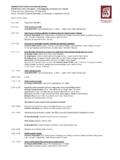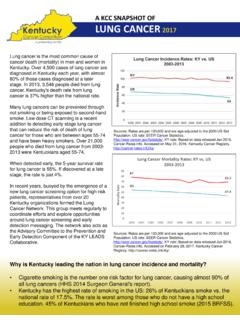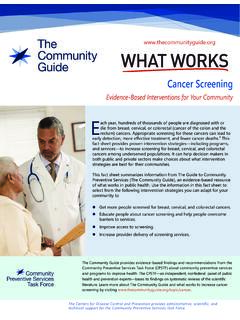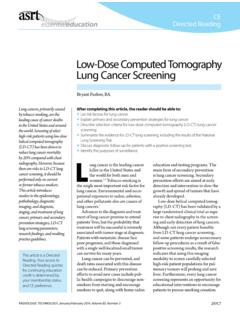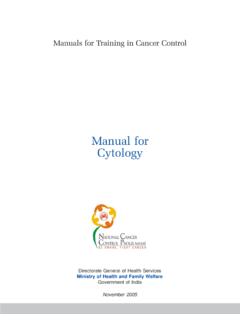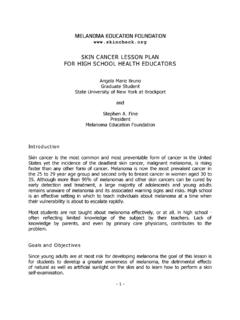Transcription of Cancer Control - WHO
1 Cancer Control Knowledge into Action WHO Guide for Effective Programmes prevention Cancer Control Knowledge into Action WHO Guide for Effective Programmes prevention WHO Library Cataloguing-in-Publication Data prevention . ( Cancer Control : knowledge into action : WHO guide for effective programmes ; module 2.). prevention and Control . planning. health programs organization and administration. policy. Health Organization. ISBN 92 4 154711 1 (NLM classi cation: QZ 200). World Health Organization 2007. All rights reserved. Publications of the World Health Organization can be obtained from WHO Press, World Health Organization, 20 Avenue Appia, 1211 Geneva 27, Switzerland (tel.: +41 22 791 3264; fax: +41 22 791 4857; e-mail: Requests for permission to reproduce or translate WHO publications whether for sale or for noncommercial distribution should be addressed to WHO Press, at the above address (fax: +41 22 791 4806; e-mail: The designations employed and the presentation of the material in this publication do not imply the expression of any opinion whatsoever on the part of the World Health Organization concerning the legal status of any country, territory, city or area or of its authorities, or concerning the delimitation of its frontiers or boundaries.))
2 Dotted lines on maps represent approximate border lines for which there may not yet be full agreement. The mention of speci c companies or of certain manufacturers' products does not imply that they are endorsed or recommended by the World Health Organization in preference to others of a similar nature that are not mentioned. Errors and omissions excepted, the names of proprietary products are distinguished by initial capital letters. All reasonable precautions have been taken by the World Health Organization to verify the information contained in this publication. However, the published material is being distributed without warranty of any kind, either expressed or implied. The responsibility for the interpretation and use of the material lies with the reader. In no event shall the World Health Organization be liable for damages arising from its use. The prevention module of the Cancer Control Series is a joint effort of the following departments at WHO headquarters: Chronic Diseases and Health Promotion; Ethics, Trade, Human Rights and Law; Immunization, Vaccines and Biologicals; Immunization, Vaccines and Research; Measurement and Health Information Systems; Mental Health and Substance Dependence; Public Health and Environment and the Tobacco Free Initiative; and also the WHO International Agency for Research on Cancer , Lyon, France.
3 The prevention module was produced under the direction of Catherine Le Gal s-Camus (Assistant Director-General, Noncommunicable Diseases and Mental Health), Robert Beaglehole (Director, Chronic Diseases and Health Promotion), Serge Resnikoff (Coordinator, Chronic Diseases prevention and Management) and Cecilia Sep lveda (Chronic Diseases prevention and Management, coordinator of the overall series of modules). Andreas Ullrich (Chronic Diseases prevention and Management) was the coordinator for this module and provided extensive editorial input. Editorial support was provided by Anthony Miller (scienti c editor), In s Salas (technical adviser), Angela Haden (technical writer and editor) and Paul Garwood (copy editor). Proofreading was done by Ann Morgan. The production of the module was coordinated by Maria Villanueva. Core contributions for the module were received from the following WHO staff: Teresa Aguado, Antero Aitio, Timothy Armstrong, Annemieke Brands, Alexander Capron, Zhanat Carr, Felicity Cutts, Poonam Dhavan, JoAnne Epping-Jordan, Kathleen Irwin, Ivan Dimov Ivanov, Ingrid Keller, Colin Mathers, Yumiko Mochizuki, Isidore Obot, Armando Peruga, Vladimir Poznyak, Eva Rehfuss, Dag Rekve, Heide Richter-Airijoki, Craig Shapiro, Kurt Straif (IARC), Kate Strong, Angelika Tritscher, Colin Tukuitonga, Andreas Ullrich, Emilie van Deventer, Steven Wiersma and Hajo Zeeb.
4 Valuable input, help and advice were received from a number of people in WHO headquarters throughout the production of the module: Caroline Allsopp, David Bramley, Rapha l Crettaz, Maryvonne Grisetti and Rebecca Harding. Cancer experts worldwide, as well as technical staff in WHO headquarters and in WHO regional and country of ces, also provided valuable input by making contributions and reviewing the module, and are listed in the Acknowledgements. Design and layout: This document's design is based on the Chronic Diseases and Health Promotion Department Style Guide developed by Reda Sadki, Paris, France. Further design and layout by L'IV Com S rl, Morges, Switzerland. Printed in Switzerland More information about this publication can be obtained from: Department of Chronic Diseases and Health Promotion World Health Organization CH-1211 Geneva 27, Switzerland The production of this publication was made possible through the generous nancial support of the National Cancer Institute (NCI), USA, and the National Cancer Institute (Institut national du Cancer , INCa), France.
5 We would also like to thank the Public Health Agency of Canada (PHAC), the National Cancer Center of Korea (NCC), the International Atomic Energy Agency (IAEA) and the International Union Against Cancer (UICC) for their nancial support. Series overview Introduction to the Cancer Control Series Cancer is to a large extent avoidable. Many cancers can be prevented. Others can be detected early in their development, treated and cured. Even with late stage Cancer , the pain can be reduced, the progression of the Cancer slowed, and patients and their families helped to cope. Cancer is a leading cause of death globally. The World Health Organization estimates that million people died of Cancer in 2005 and 84 million people will die in the next 10 years if action is not taken. More than 70% of all Cancer deaths occur in low- and middle-income countries, where resources available for prevention , diagnosis and treatment of Cancer are limited or nonexistent.
6 But because of the wealth of available knowledge, all countries can, at some useful level, implement the four basic components of Cancer Control prevention , early detection, diagnosis and treatment, and palliative care and thus avoid and cure many cancers, as well as palliating the suffering. Cancer Control : knowledge into action, WHO guide for effective programmes is a series of six modules that provides practical advice for programme managers and policy-makers on how to advocate, plan and implement effective Cancer Control programmes, particularly in low- and middle-income countries. iii A series of six modules Cancer Control Knowledge into Action WHO Guide for Effective Programmes PLANNING. A practical guide for programme managers on how to plan overall The WHO guide is a response to the World Health Assembly Cancer Control effectively, resolution on Cancer prevention and Control ( ), adopted 6.
7 According to available resources and integrating Cancer Control in May 2005, which calls on Member States to intensify action with programmes for other chronic against Cancer by developing and reinforcing Cancer Control diseases and related problems. Planning programmes. It builds on National Cancer Control programmes: policies and managerial guidelines and Preventing chronic Cancer Control diseases: a vital investment, as well as on the various WHO. Knowledge into Action WHO Guide for Effective Programmes prevention policies that have in uenced efforts to Control Cancer . a practical guide for programme managers on how to implement effective Cancer prevention by Cancer Control aims to reduce the incidence, morbidity and mortality controlling major avoidable Cancer of Cancer and to improve the quality of life of Cancer patients in risk factors. a de ned population, through the systematic implementation of evidence-based interventions for prevention , early detection, prevention diagnosis, treatment, and palliative care.
8 Comprehensive Cancer Control addresses the whole population, while seeking to respond Cancer Control to the needs of the different subgroups at risk. Knowledge into Action WHO Guide for Effective Programmes EARLY DETECTION. A practical guide for programme managers on how to implement effective early detection of major types of Cancer that are amenable COMPONENTS OF Cancer . to early diagnosis and screening. Control . Early Detection prevention of Cancer , especially when integrated with the prevention of chronic diseases and other related problems (such Cancer Control as reproductive health, hepatitis B immunization, HIV/AIDS, Knowledge into Action WHO Guide for Effective Programmes DIAGNOSIS AND TREATMENT occupational and environmental health), offers the greatest A practical guide for programme managers on how to implement public health potential and the most cost-effective long-term effective Cancer diagnosis and method of Cancer Control .
9 We now have suf cient knowledge to treatment, particularly linked to early detection programmes or prevent around 40% of all cancers. Most cancers are linked to curable cancers. tobacco use, unhealthy diet, or infectious agents (see prevention Diagnosis and module). Treatment Early detection detects (or diagnoses) the disease at an Cancer Control Knowledge into Action WHO Guide for Effective Programmes PALLIATIVE CARE early stage, when it has a high potential for cure ( cervical A practical guide for programme or breast Cancer ). Interventions are available which permit the managers on how to implement early detection and effective treatment of around one third of effective palliative care for Cancer , with a particular focus on cases (see Early Detection module). community-based care. There are two strategies for early detection: early diagnosis, often involving the patient's awareness of Palliative Care early signs and symptoms, leading to a consultation with Cancer Control a health provider who then promptly refers the patient Knowledge into Action WHO Guide for Effective Programmes POLICY AND ADVOCACY for con rmation of diagnosis and treatment.
10 A practical guide for medium level decision-makers and programme managers on how to advocate for national or regional screening of asymptomatic and policy development and effective apparently healthy individuals to detect pre-cancerous programme implementation for lesions or an early stage of Cancer , and to arrange referral Cancer Control . for diagnosis and treatment. iv Policy and Advocacy Series overview Treatment aims to cure disease, prolong life, and improve the quality of remaining life after the diagnosis of Cancer is BASIC PRINCIPLES OF Cancer Control . con rmed by the appropriate available procedures. The most effective and ef cient treatment is linked to early detection Leadership to create clarity and unity of programmes and follows evidence-based standards of care. purpose, and to encourage team building, broad participation, ownership of the Patients can bene t either by cure or by prolonged life, in cases process, continuous learning and mutual of cancers that although disseminated are highly responsive recognition of efforts made to treatment, including acute leukaemia and lymphoma.










